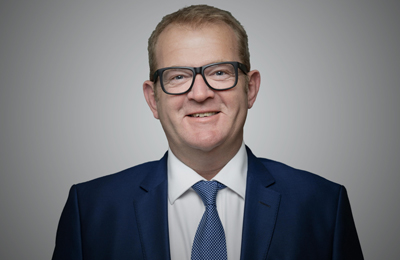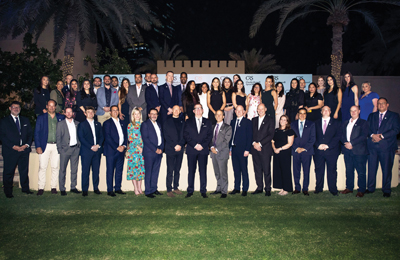Building on local roots…

As Charles Russell Speechlys Middle East celebrates a double anniversary this year, managing partner Patrick Gearon talks to the Oath on the firm’s achievements, learning from challenges and prospects for the future.
1. Congratulations to the firm on the double-anniversary – 15 years in Bahrain and 5 years in Dubai! As a firm, you have been operating in the region with clients in the GCC for over 30 years. What are your thoughts on this milestone?
The development of our business in the region has tracked the development of the region itself. Our dynamic growth has run in parallel with the dynamic growth of the Gulf and the growth of our clients. Our clients’ requirements are always at the heart of all our decision making. We opened in Bahrain at the request of a client for an ‘on the ground’ team. Similarly, opening the firm’s office in Dubai was also driven by client demand. Our success has therefore been linked with the requirements, demands and successes of our clients. Doing business in the Gulf has become more diverse and complex. Law firms have to keep pace with that. We have been fortunate to act on some of the biggest cases and transactions in the region over the last 15 years which makes the work challenging and interesting and that, in turn, attracts the best of lawyers. This virtuous circle has led to exceptional growth particularly in the last 9 years during which our Middle East team has grown from 7 to 66 people.
2. A lot of firms have aimed to have roots in the local market of the region. In your view, what has helped the firm succeed?
The development of a business in the Gulf region requires a long-term view. The last 10 years have seen significant economic, social and security changes in the region. Some of those changes have happened suddenly and with little advance warning. If one were to react to each change by taking a short term view, it is unlikely that one’s business would flourish. We have, since the outset of our business in the Gulf, taken a long-term view in terms of how we grow our business. This has manifested itself in a thorough integration of our business into local economies. An example of this is our Bahrain recruitment programme. In the last 9 years, we have employed 12 Bahrain Law graduates as paralegals under a programme whereby they ultimately become dual-qualified Bahrain and UK lawyers. This long-term planning has resulted in a cohort of bilingual dual-qualified lawyers who have grown up in the jurisdictions where we have offices. Hence, they understand the business culture, the service delivery that is expected and the aspirations of our clients.
We have also embraced the concept that the world does not revolve around a common law legal system model. We have built civil law specialist teams in each of our Gulf offices particularly for civil law litigation teams. This not only provides our clients with a ‘one stop shop’ for all their common law and civil law needs, it also integrates us further into the jurisdictions in which we operate.
3. On reflection, what are some of the biggest challenges the firm has had to overcome over the years?
Security issues have impacted our operations in some of our offices from time to time. Our development has also been affected by political issues. It was difficult, for example, to grow our Qatar office during the years of the GCC embargo. The impact of the COVID pandemic was initially quite significant as we (along with everyone else) had to adapt quickly to lockdowns, working from home and how best to serve our clients’ needs from a ‘remote working’ environment.
This theme of adaptation borne of necessity rather than choice was probably the biggest challenge. However, that process of adaption brought insight into how robust and useful our technology was and how quickly we could, in fact, change the way our business operated to deal with those challenges. Within the legal profession, it was also heartening that the Courts, arbitration centres and registries throughout the region all stepped up during the pandemic. These institutions all embraced technology that could allow the functions necessary for the legal system to continue to operate and the speed of that adoption is something we can take pride from.
4. What’s the main change you’ve made in the firm that benefits clients?
From a practical perspective, two years before the pandemic, we invested heavily in our IT systems including a focus on upgrading our systems to fully enable remote working. We cannot claim specific foresight for those changes, but they did mean that the rapid transition from an in office and in court working to working from home was less challenging for us than for others.
The other less dramatic change that has had as significant an impact is the recruitment of and integration of civil law trained lawyers to our existing cohort of common law lawyers. The distinctions between civil law and common law systems are becoming blurred particularly in disciplines such as international arbitration. Clients are now increasingly seeking ‘one stop shop solutions’ to their legal issues. All of this means that international law firms will, increasingly, be expected to provide civil law and common law solutions under one roof. Due to the long term view we took 9 years ago, we are now well-placed to meet that client demand.
5. The firm has made some key and strategic hires over the last few years. Are there any specific practices you see growing in the next 12 months? What are the drivers behind that?

The Charles Russell Speechlys Middle East Team
Dispute resolution will continue to dominate in terms of new instructions over the next 12 months. We have two new dispute resolution partners joining our Dubai team within the next 3 months which reflects our view that this area of practice is going to see significant growth.
Restructuring work and to a lesser extent insolvency will rise over the next 12 months. We have already witnessed a substantial increase in restructuring transactions in the Real Estate and Hospitality sectors, while our banking team has been seeing an increase in debt restructuring transactions.
We also see a significant shift away from institutionally-financed transactions to those funded by private capital. The continued rise of family office structures and investments is noticeable, and we see this shift from institutional to private capital growing over the next year.
6. The pandemic brought about opportunities and challenges, especially for law firms operating in the region. It’d be great to hear about the lessons learnt as firm over this period as well.
I have mentioned the IT challenges above. The more intangible challenge was motivating people and retaining the team glue that has been so important to our growth during a time when the team members could have no physical contact with each other. The other issue at times was retaining an atmosphere of hope (primarily hope that the pandemic would be over at some point and that we would, eventually, return to some form of normality). The first half of 2021 was probably the most challenging period in that regard, but it is a testament to the team spirt and dedication of our people that our Firm actually grew during that period.
The pandemic also debunked the myth that you have to be in the office to be productive. Our productivity per lawyer went up in 2020 and 2021, not down.
7. Looking forward, what’s the firm’s strategy for the next five years in all the three offices combined?
Our core strategy is to grow the firm internationally. With the rapid and successful expansion of our team and capabilities in the Middle East, this region is and will continue to be, an important focus for the firm’s further strategic growth. Although the rate of expected growth varies between the three offices, our key strategy is to provide our clients with the optimum level of support and the highest standards of client care at all times. Due to the increased demand for diversified services, we are looking to grow our presence in other key markets in the region with a focus on a CRS presence in Saudi Arabia within the next 18 months.
Alongside this, we will continue to grow our common law and civil law disputes teams, further bolstered in early 2023 with a confirmed significant lateral partner hire who brings over 20 years of Middle East Dispute Resolution experience to our Dubai team and the wider firm.
We are also increasing our corporate and commercial capabilities with an additional lateral partner hire who has a strong regional market reputation, and he is set to join our Dubai practice in December 2022.
In addition, we are also looking at opportunities in the next 12 months to increase our regional private wealth and employment capabilities to further support our regional clients.
























































































































